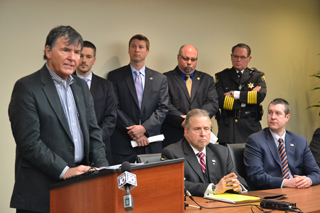In 2011 the legislature passed a number of reforms to help employers control costs and be better stewards of taxpayer resources. One of the, if not the, most significant reform was to prohibit retroactive pay increases after a contract has expired. This game changing statute, PA 54 of 2011, has helped communities settle contracts more quickly and provides more certainty in municipal budgets. We are hearing the House Commerce Committee will be taking up House Bill 5097, a bill that would exempt police and fire from PA 54 so they can have retroactive pay increases after a contract expires. This would be detrimental to our ability to settle contracts quickly and efficiently. The bill was taken up for testimony this morning in the House Commerce committee.
The committee reaction was relatively expected. There was a lot of talk about legislative history and the intent of this legislation being school employees not municipal employees.
The League testified along with a labor attorney who works with a number of communities. We indicates that PA 312 numbers are down and this statute is working well. We don’t see a need to change it.
I urge you to contact your legislators to let them know how detrimental this carve out would be. The arguments the public safety groups use for supporting this bill are that the number of PA 312 filings would proliferate and the legislature only intended this bill to impact teachers.
According to the Michigan Employment Relations Commission there were only 43 PA 312 filings in 2013 as opposed to 69 in 2011. PA 312 filings are significantly lower than they were before enactment of PA 54.
In addition, even if the legislature only intended this for teachers, it has been a game changer for municipal budgets, and it’s critical that we keep this tool to allow local units the opportunity to settle contracts expeditiously and save taxpayers money.
We appreciate all the members who have already contacted their lawmakers on this issue and we hope others follow their lead. It is critical that you please contact your legislators and ask them to OPPOSE House Bill 5097. You can find the contact information for your Legislators here.
We’re also starting to see some traction on this issue in the media, including an article in Gongwer News Service with the headline “MML Beginning Opposition Campaign on Retroactive Pay Raises Bill”. The article, which can be viewed here if you subscribe to Gongwer, includes references to this blog post.
Samantha Harkins is the Director of State Affairs for the Michigan Municipal League. She can be reached at 517-908-0306 or email at sharkins@mml.org


